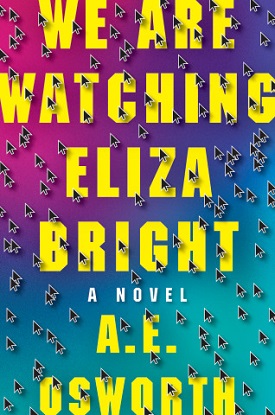 Synopsis
Synopsis
Eliza Bright is an elite video game coder at Fancy Dog Games in New York City, the first woman to ascend that high in the profession. And that makes some people want to make sure she’s the last.
To her friends, Eliza is a brilliant, self-taught coder bravely calling out the misogyny that pervades the Fancy Dog workplace, as well as the industry as a whole.
To the men who see her very presence at Fancy Dog as a threat, Eliza is a woman who needs to be destroyed in order to protect the online game they love.
Eliza’s report of workplace harassment is quickly dismissed. So she voices her frustrations to a journalist. Her story is blasted on the internet. As a result, she’s fired and doxxed (private information about her is maliciously shared on the internet).
And she immediately becomes a rallying figure for women everywhere.
But in the process, she enrages the beast comprised of online male gamers, a chorus of whom serve as the story’s unreliable narrator. Soon, Eliza is in the cross-hairs of the gaming community, threatened and stalked as they monitor her every move online and across New York City.
As the violent power of the angry male collective descends upon everyone in Eliza’s life, it becomes increasingly difficult to know who to trust, even when she’s eventually taken in and protected by an under-the-radar Collective known as the Sixsterhood. The violence moves from cyberspace to the real world, thanks to a vicious male superfan known only as The Inspectre who is determined to exact his revenge on behalf of men everywhere.
We watch alongside the Sixsterhood and subreddit keyboard warriors as a dramatic cat-and-mouse game careens toward a violent and inevitable conclusion.
Review:

Author A. E. Osworth is a part-time faculty member at The New School, teaching digital storytelling to undergraduates. Osworth has been a freelance writer for more than eight years, with work published at Mashable, as well as other sites. We Are Watching Eliza Bright, their debut novel, was long listed for The Center for Fiction First Novel Prize.
Eliza Bright’s whole life is turned upside down after she dares to speak out against workplace sexual harassment. She is employed at Fancy Dog Games, developer of Guilds of the Protectorate, a multiplayer online role-playing game similar to World of Warcraft. The game’s virtual reality consists of superheroes and villains in Windy City, a fictionalized combination of New York City and Chicago inspired by those cities’ actual landscapes. The game was created by company founders Preston Waters and his college roommate. Employees all play the game using their virtual identities which are known to each other. Preston sits in a glass-walled space in the middle of the office with his dog (named “Dog”), and employees are encouraged to bring their own dogs to work, as well. Like Eliza, Preston is twenty-year years old. He does not have a business degree. And lacks any experience running a company.
Eliza was hired to work in quality assurance, but after a year and a half spent teaching herself coding, she was promoted just three days ago. Preston made it clear that if she wants to advance at Fancy Dog Games, she will have “to eat, sleep, breathe and live Guilds of the Protectorate. You have to understand how everything works from all corners. You have to totally immerse yourself. . . . Do you want it? Do you want it bad enough to do all that, to not have a life outside of this for years, and then to potentially fail at it because the muse didn’t catch the right train?” Eliza assured him she wanted it.
Gamergate is a bunch of crap. It’s not about ethics. It’s about scaring women. I am not quitting — I never will. I am not scared, I never will be. ~~ Eliza Bright
Now Eliza is a member of a three-person coding team and arrives at work on Monday morning after working all weekend to find that her work on the game’s new feature (dubbed the “sex patch”) was changed using Github after she completed the assignment. Now the section of code she drafted is replete with “//80085,” but she quickly notifies her colleagues and uploads a clean copy so they won’t have to waste time fixing any sort of bug. Her male teammates are Jean-Pascale Desfrappes and Lewis Fleishman, known as JP and Lewis or, within the game, Black Hole and Dr. Moriarity. And they are not at all happy about the prospect of working with Eliza. Or any woman, for that matter. When Eliza asks her friends, Devonte Alba, a gameplay developer working in high-level quality assurance, and Suzanne Choy, who is in charge of customer service, about the strange code, they immediately recognize that Eliza is being set up. It means “boobs” and her male teammates have inserted it throughout her code.
The narration is astute, clever, and chilling, comprised of the “collective, hive-mind brain” that is the internet. “We’re always here, on the internet, eyes trained on our cast. On Twitter, Reddit, even in Windy City, we can find out a lot. And what we don’t know, we can guess; or we can ask; or we can invent.” Hence, their unreliability. They are voyeurs with an agenda, “obsessed with what goes on where we can’t see it.” Through them, readers watch events unfold as observers exposed to both the action and the narrators’ (“the Reddit manosphere”) opinions. For instance, observing Eliza’s distress at discovering the true meaning of the code and her consternation over whether to report her teammates’ behavior, the collective narrator notes, “It’s not a big deal! She’s making a mountain out of a molehill, and at the first sign of actual gaming culture, she’s running away and crying. If she can’t do the job, she doesn’t belong here. But whatever, cry alone. Go for it.” The narration moves from actual events to developments taking place within the game, and includes text messages between the characters, all of which move the story forward at an unrelenting pace.
Osworth says the story was “heavily, heavily influenced by and loosely based on” Gamergate, an event Osworth refers to as a “raging wildfire of misogyny,” homophobia, and transphobia. In August 2014, independent game developer Zoe Quinn and gaming critic Anita Sarkeesian were harassed online. Quinn’s ex publicly and falsely accused her of sleeping with a journalist in order to get favorable reviews. Writers Jenn Frank and Mattie Brice were also targeted. The systemic, consistent abuse of Quinn and other women in and associated with the gaming industry led to an FBI investigation, and spawned debate about sexual harassment, feminism, and journalistic integrity. Threats against some of the targets were so specific that they were forced into hiding and, in some cases, career changes. At the time, Osworth was covering “nerd culture” and they did not actually realize they were writing about it “until it started coming out of me.” They were so angry about the situation, in part, because it impacted the culture of online gaming. So essentially, writing We Are Watching Eliza Bright amounted to raging against Gamergate.
Eliza does, in fact, report that she has been subjected to sexism in the workplace and the story is an analysis of the fall-out from her decision. We Are Watching Eliza Bright is a profoundly searing examination of both a toxic workplace culture, and the impact of the internet and that collective voice in the wake of Eliza’s decision to speak up and stand up for herself. In crafting the story, Osworth says they “knew from the jump that Eliza wasn’t going to quit” and she doesn’t. She is a strong, determined woman who knows that the behavior to which she is subjected is wrong and she does not have to settle for being treated with anything but professionalism and respect in her workplace.
We are Watching Eliza Bright is engrossing and creative. When Eliza finds herself in danger, she takes refuge with the Sixsterhood, a queer artist collective residing in a warehouse that serves as a contrasting collective voice. Those choruses, like the voices of each of the individual characters, are credible and relatable. Osworth cleverly ensnares readers into being part of the choruses, forcing them to question whether they are in agreement with their messages or sufficiently outraged by the misogyny that they, like Eliza, would stand strong against it even at great personal peril. In fact, Osworth relates that the experience of writing the story gave them the tools to examine what happens when they “think a thought that I don’t endorse. I get to think about how to address that. When I think a thought about me that sounds like my narrators should say it, I know that’s not coming from me. That’s coming from the misogynistic voices that we’re all getting all the time. How can I figure out how to diffuse that?”
We Are Watching Eliza Bright is a thoroughly suspenseful thriller in which Eliza is stalked by a crazed gamer who uses the internet in an effort to achieve retribution. Thus, the story is simultaneously contemporary and timeless. The setting and backdrop Osworth utilizes to tell the deeply disturbing story are decidedly timely, but Eliza’s fear, frustration, and anger could be compellingly portrayed in many different time periods. Osworth believes that many novels are now addressing internet issues because “so much of our lives are lived on the internet now that we have phones in our pockets” and we are constantly connected, but it is interesting that “we are turning to a much older art form to make sense of” our relationship with technology and the interactions that take place online. Like many of us, Osworth confesses to having a love-hate relationship with the internet, which is visible in the story. Osworth’s passion for the subject matter and their characters is equally evident on every page, as is their empathy for Eliza and her plight. Indeed, they proved “I am a person who can, in fact, write 419 pages out of spite.” And in this case, spite spawned a dark but highly entertaining and thought-provoking story.
We Are Watching Eliza Bright is a riveting, first-rate debut novel with a powerful message about empowerment, persistence, and feminism, as well as a considered examination of the tenuous boundary between real life and online existence. “The lack of community in physical space is what gives rise to stalkers . . . and what gives rise to the weaponized nerd populations today. The lack of human interaction is how young white men can be radicalized on the internet and turned into real, violent white nationalists.” Important conclusions from a talented new voice in fiction.



Comments are closed.